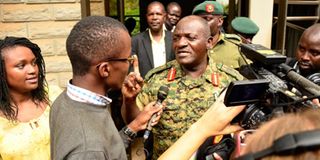UPDF troops leave South Sudan

The Chief of Defence Forces, Gen Katumba Wamala, addresses journalists at the government Media Centre yesterday. PHOTO BY DOMINIC BUKENYA
What you need to know:
Change of guard. A 12,000-strong UN force will replace UPDF, and protect civilians, maintain public safety and security, monitor and investigate human rights violations, secure corridors for delivering humanitarian aid, and support the implementation of the peace agreement.
KAMPALA. The UPDF yesterday began withdrawing from South Sudan, two days after the UN Security Council warned of “appropriate measures” against those preventing implementation of the country’s peace agreement.
“The boys are coming back home,” the Chief of Defence Forces, Gen Katumba Wamala, told a press conference at the government Media Centre in Kampala. The exercise, which includes movement of troops, heavy weaponry and combat helicopters, will last up to early November, he said.
About 3,000 Ugandan troops deployed in South Sudan in mid-December 2013 to shore up the government of President Salva Kiir, then shaken by an attack by soldiers loyal to former Vice President Riek Machar.
The skirmishes which began in the capital, Juba, quickly fanned into a vicious countryside civil war, which, according to the United Nations, resulted in the death of thousands and displacement of 2.2 million civilians.
In the October 9, 2015 resolution, the UN Security Council ordered the immediate deployment of 12,600 blue-helmeted troops alongside 1,300 police personnel to bolster security in Juba. They will, among other tasks, protect vital state installations, guarantee civilian security, secure corridors for humanitarian aid and enforce implementation of the Igad mediated pact that the warring parties signed in Addis Ababa, Ethiopia, in August.
The UN force was given an expanded mandate, extended up to December. The resolution tasked the UN secretary-general Ban Ki-moon to report to the Security Council within 45 days about its deployment, work and additional resources, including force multipliers like helicopters, required to accomplish assigned mission.
The Ugandan army’s deployment in South Sudan was initially praised for stemming potential genocide, enabling the evacuation of foreign nationals and maintaining a balance of power between the warring factions. It, however, soon got sucked into the country’s partisan politics and was criticised for instead propping up President Kiir.
It was supposed to have withdrawn from South Sudan within 45 days after the August 17 agreement, but did not; drawing accusation mainly from Machar’s camp that their continued stay violated the pact.
In Kampala, ministry of Foreign Affairs Permanent Secretary James Mugume said Uganda welcomed the latest UN resolution and was happy to abide by it. “Accordingly, in compliance, Uganda today announces the beginning of the withdrawal of UPDF from South Sudan,” Amb. Mugume said.
The UPDF Land Forces commander, Maj Gen David Muhoozi, was by yesterday in Juba coordinating an orderly withdrawal, Gen Katumba said.
The troops will be exiting their main base in Juba and Jonglei State whose capital, Bor, was their forward operating base and an epicentre of fierce battles between Ugandan army and Machar’s rebels.
Gen Katumba said UPDF did not abide by last Saturday’s deadline for its withdrawal because “it was not a matter of running away, but an organised withdrawal and hand-over to South Sudan [authorities].”
Nine soldiers died in one direct encounter with the rebel force, Gen. Katumba said, insisting there were no extra costs of the almost two-year operations for Uganda since the government of South Sudan provided fuel.
There had been earlier proposals that six battalions from Kenya, Rwanda and Ethiopia be deployed under the Intergovernmental Authority on Development (Igad) to replace UPDF. Amb Mugume, reading from a prepared text, said the United Nations Mission in South Sudan (UNMISS) that has operated in South Sudan since 2011, was instead mandated to substitute the Ugandan military.
Last year, president Kiir accused UNMISS of supporting his rival, Machar, an allegation the UN dismissed. The opposition armed fighters led by Riek Machar yesterday welcomed the announcement by the Ugandan government.
Under the August agreement, Juba is to be demilitarised and South Sudan troops are to withdraw 25 kilometres out of the capital.
A spokesman for President Kiir, however, said they will remain with 5,000 presidential guards, police, prison guards, fire brigade and wildlife in Juba.
UPDF troops in Western Equatoria under Regional Task Force hunting down the Lord’s Resistance Army and its elusive leader Joseph Kony, will remain in South Sudan.




